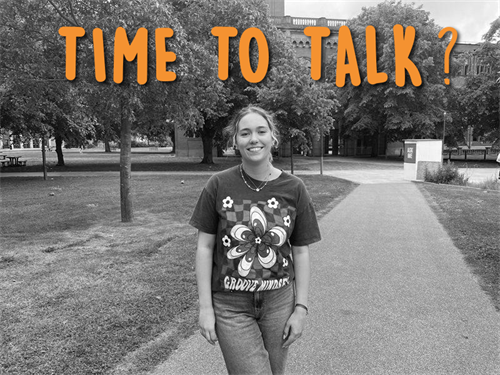It's okay to not be okay
I’m Gracie, a third-year student and one of the Student Content Shapers. University can be an exciting time for many, but also a very lonely time too. I have definitely felt both of these things during my time at university. And that’s okay. It’s okay to not be okay, as cliché as that phrase has become, it’s never been truer.

As the University launches its Time to Talk? campaign for this year, now is a better time than ever to introduce some of the support available for your mental health and wellbeing at UoB, and beyond, from a fellow student who has used several of these services too.
Removing the stigma around mental health
In terms of mental health support, there’s a range of avenues through the University – some which I have used. I know that not everything will be suitable for everyone, and every issue, but I hope that I can give some guidance about what is out there.
Whether you’re an undergraduate or postgraduate, please know there’s no shame in seeking help and accessing any of these services.
Having struggled with loneliness and mental health issues throughout my time at University, I want anyone reading this to know that it’s okay to ask for help. I have had counselling, CBT (cognitive behavioural therapy), and spent a good proportion of my university life on anti-depressants too, so I really want to help remove the stigma around mental health. If I can talk about this, hopefully someone reading this will know that it’s okay not to be okay.
Free, confidential services
Whatever you’re going through, you can access support through the University’s Mental Health and Wellbeing Services. One of the services that is available is UBHeard, a confidential listening and support service that gives you immediate emotional and mental health support 24/7, 365 days a year. They are here for you when you’re ready to talk. You can reach out via phone, live chat by logging through the UBHeard portal, or text.
You can also reach out to a Wellbeing Officer in your School. They are trained to provide practical and emotional support, advice and guidance on any issues you’re facing, especially if those issues are impacting your studies.
Pause@UoB is a drop-in service for students up to the age of 25. Located in The Lodge, next to the North Gate, you can drop in every Wednesday and Thursday, 11AM to 5PM and talk about anything that may be worrying you. Remember, there’s nothing to be embarrassed about, and both these services are private and confidential. Pause@UoB also run activity sessions too – more information can be found on the student intranet.
If you haven’t already, I would also recommend registering with a local GP (doctor), especially if you’re living away from home. There are several near the student area, such as University Medical Practice, and Bournbrook Medical Practice. By doing this you can access local mental health services in Birmingham, one which I personally recommend is Forward Thinking Birmingham - a mental health service specifically young people (up to the age of 25). There are a range of service you can access through this, as well as advice on how to deal with loneliness, addiction, and mental health.
Talking of addiction, if this is something you’re struggling with then the University SMART Recovery Group can support you with this. The group meet every Wednesday from 1.30-3pm in the Beale Room, Aston Webb. There’s also the student-led ‘Better Than Well’ recovery programme and community which hosts weekly drop-ins, meditation classes and recovery celebrations and sharing sessions.
Time to Talk?
Whoever is reading this, I hope that you’re doing okay, but if you’re not, that’s okay too. University can be an overwhelming experience for so many different reasons, but you don’t need to struggle alone. There is help out there, and there is no better time to talk than now.
Visit the Time to Talk? page to find a service that works for you.